Number of Smoothie King Locations in the United States of America
There are 1,246 Smoothie King locations in the United States of America as of November 17, 2025. The state or territory with the most Smoothie King locations is Texas, with 291 sites, accounting for roughly 23.4% of the total.
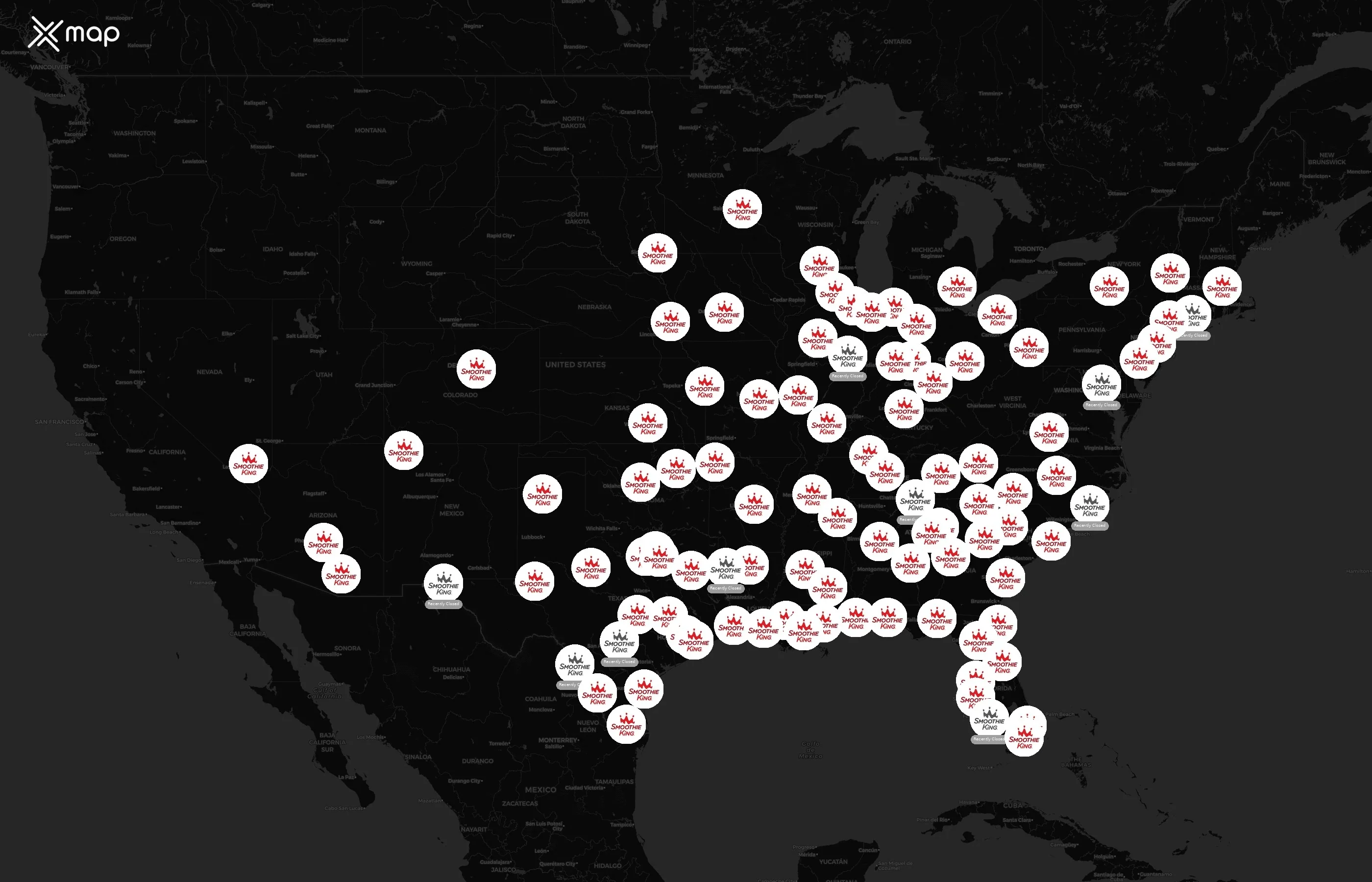
How many Smoothie King are there in the United States of America?
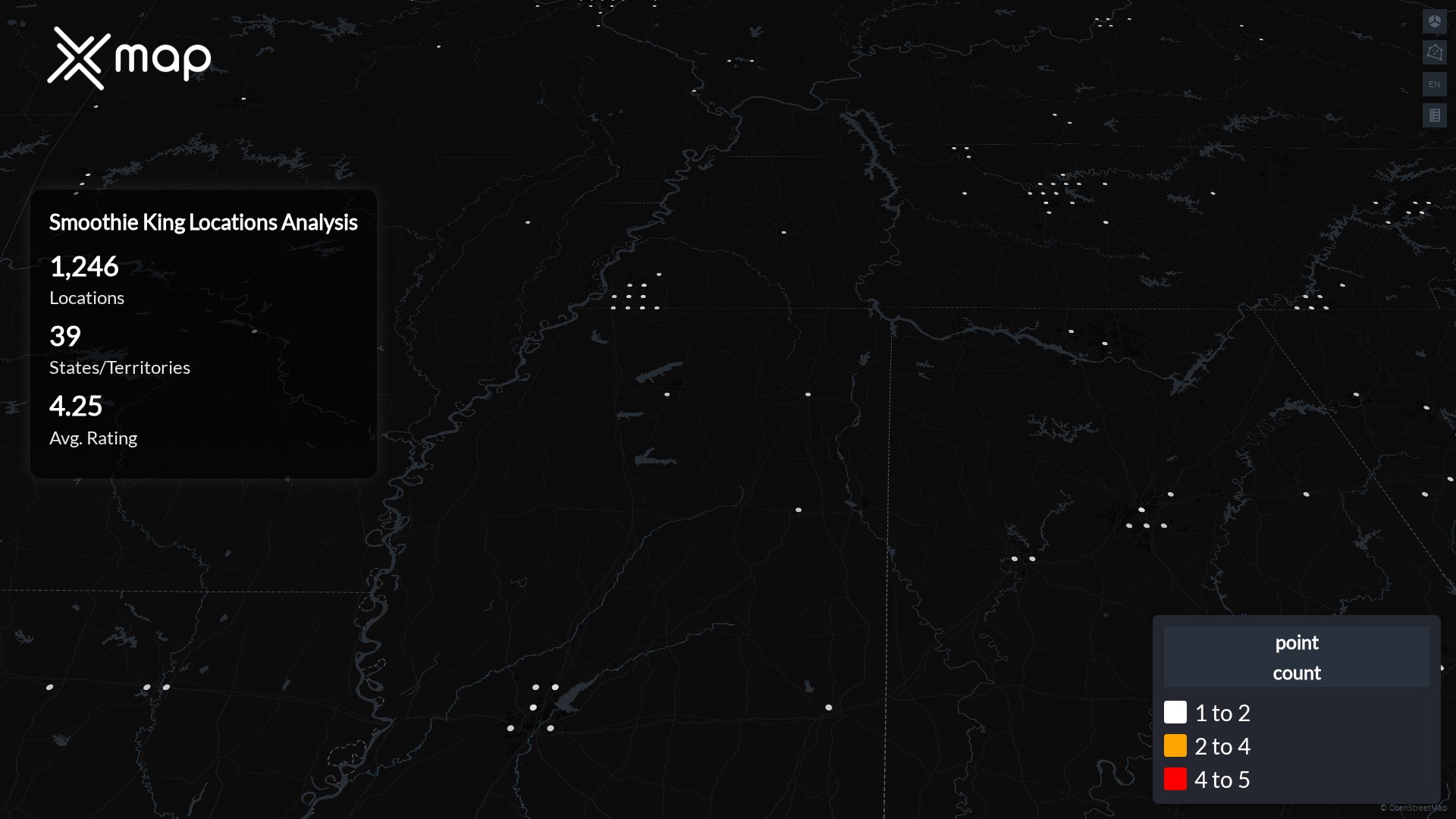
1,246
1,239
1,246
1,246
0
Distribution of Smoothie King Locations Across United States of America by State
Smoothie King operates 1,246 United States of America locations across 39 states. Largest clusters are in Texas, Florida, and Georgia; the top 10 states contain 74.8% of sites. Coverage is thinner in New Mexico, South Dakota, and Utah.
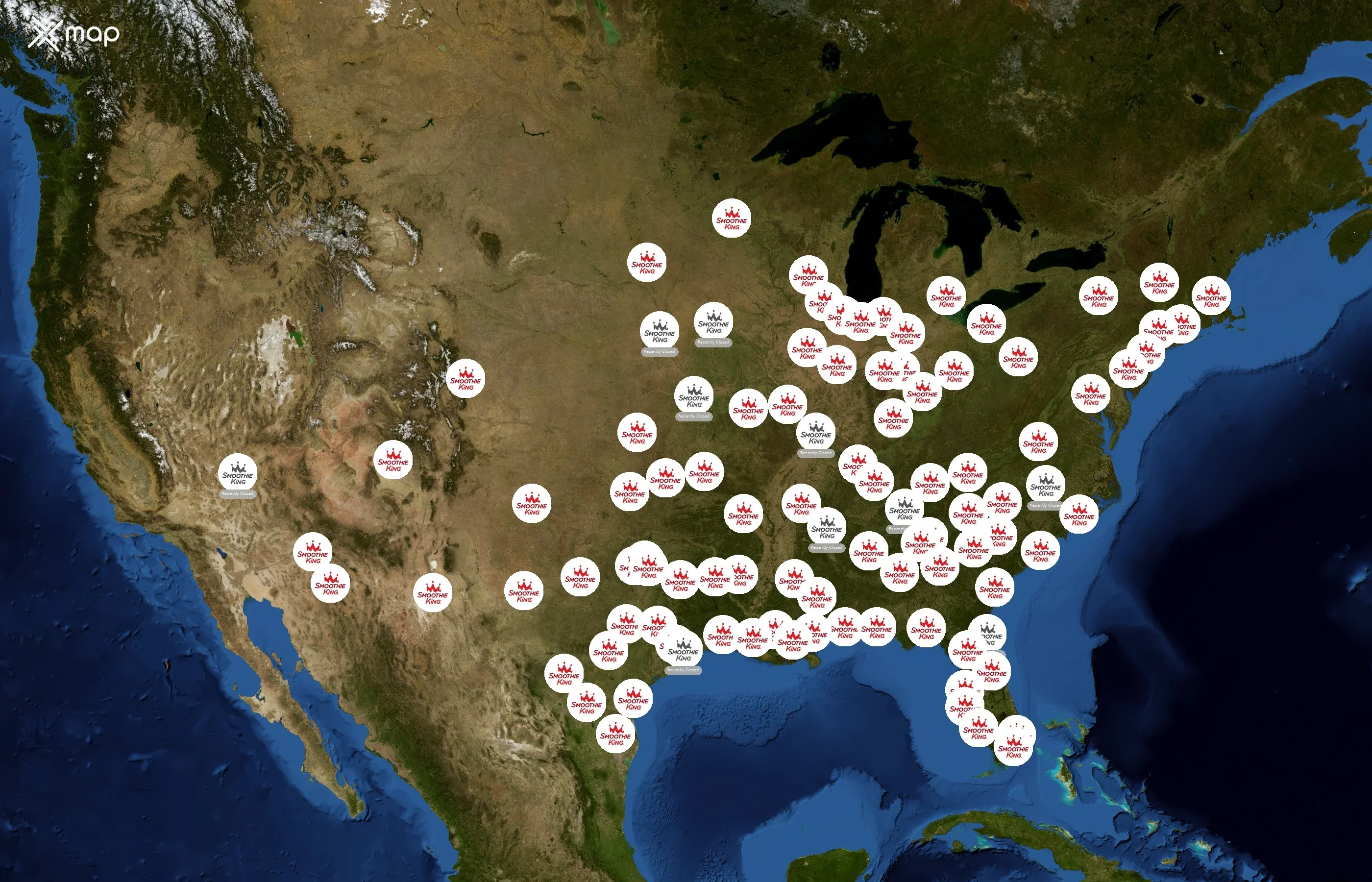
Top 10 States with the most number of Smoothie King locations in United States of America
Smoothie King shows strong visitor engagement: 615 locations are above the mean traffic score (mean: 52.44) and 190 qualify as highly visited.
Smoothie King operates 1,246 locations across the United States, with Texas hosting the largest share at 291 stores (23.4%). The top three states—Texas, Florida, and Georgia—account for 43.5% of all locations, while the top ten states cover 74.8%. Louisiana offers the best access with the lowest population per location (44,196), whereas Minnesota, Massachusetts, and Utah have the highest population per location, indicating more stretched coverage.
Smoothie King per capita insights
- States (Louisiana, Georgia, Texas) enjoy the best per capita access to Smoothie King.
- States like Florida, Illinois, North Carolina, Indiana, Ohio, despite their large number of locations, are under-served on a per-person basis, signaling potential demand for suburban expansion.
- Several states strike a balance between population growth and Smoothie King density, making them hotspots for sustained competition.
Cities With the Most Smoothie King Locations in the United States of America
Locations concentrate around major metros such as Harris, Tarrant, Dallas, Miami-Dade, and Mecklenburg. The top 10 cities account for 21.6% of U.S. sites.
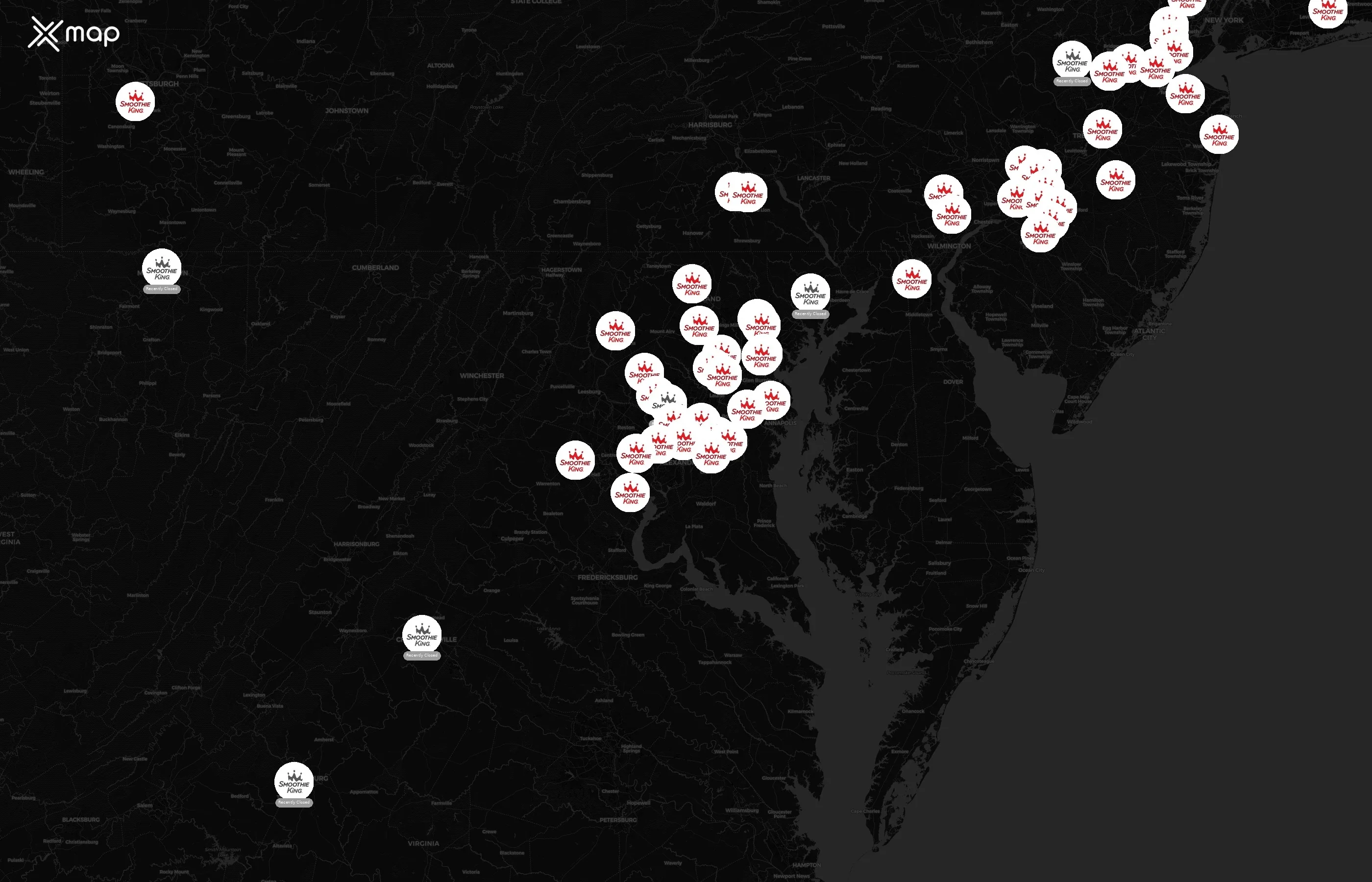
Top 10 Cities Ranked by Location Count
Smoothie King operates 1,246 locations across the United States, with the top 10 cities accounting for 21.6% of these. Harris, Texas leads with 65 locations, followed by Tarrant, Texas with 30, and Dallas, Texas with 27. Other notable cities include Miami-Dade, Florida (25 locations) and Mecklenburg, North Carolina (23 locations).
Street-level hotspots (busiest streets with multiple Smoothie King)
Street-level clusters show corridors where multiple Smoothie King locations sit within the same neighborhood indicating strong local presence and coherence. Smoothie King operates a total of 1246 nationwide.
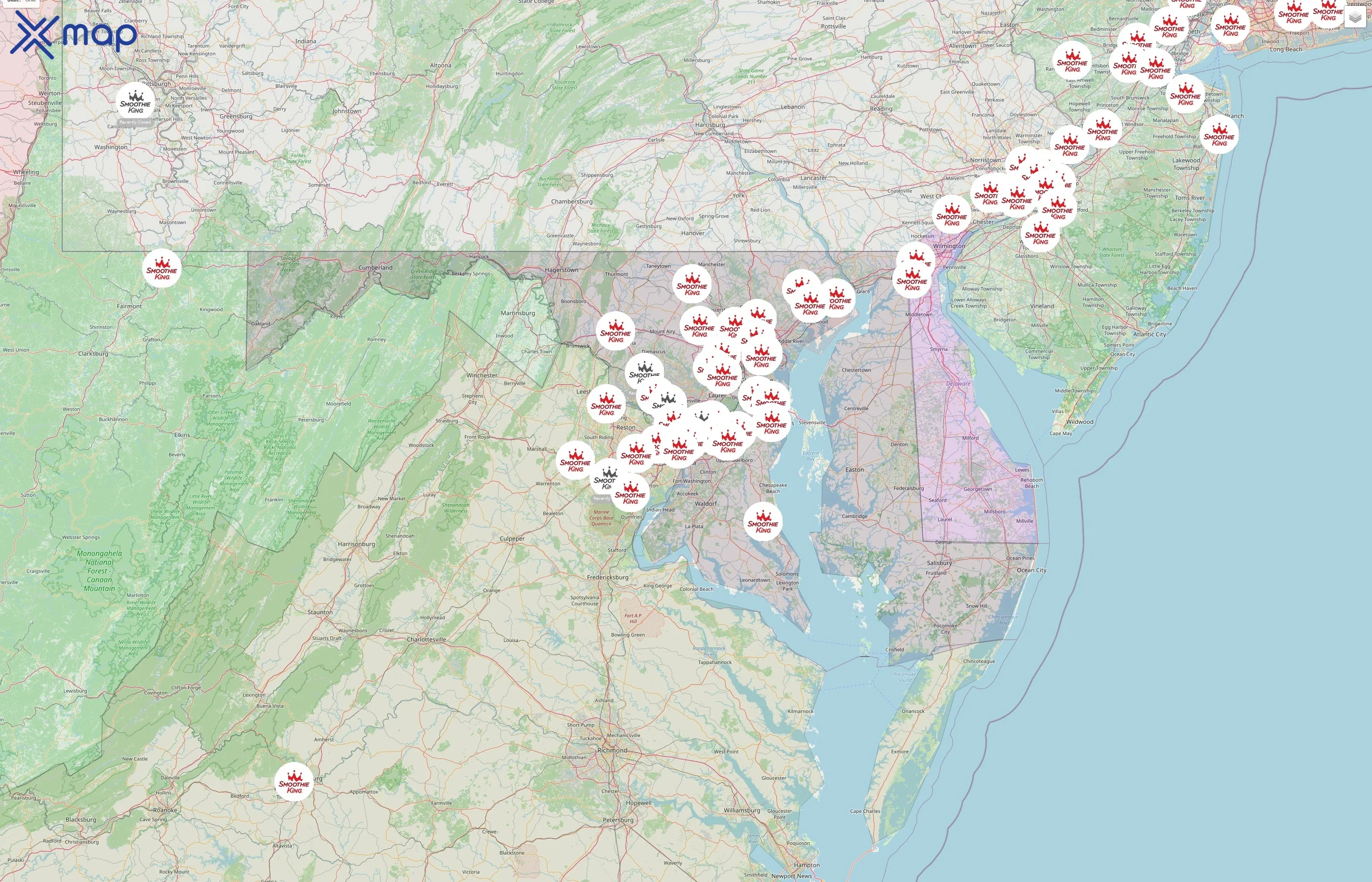
Download Smoothie King Outlets Points of Interest Data
The complete dataset of Smoothie King locations across the United States of America is available for download, including coordinates, traffic patterns, and operational status.
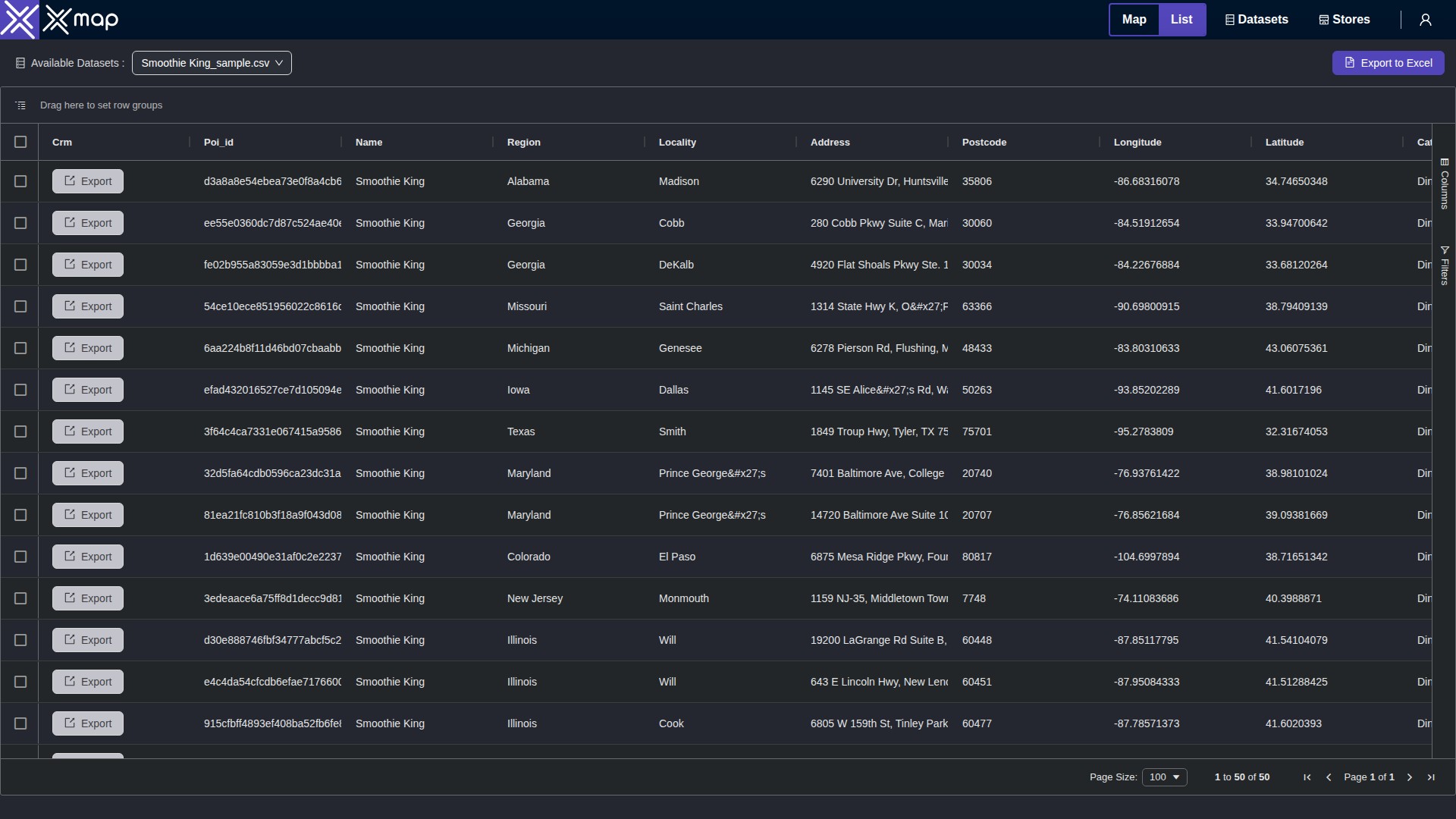
Key Variables for Smoothie King Points of Interests
Smoothie King has 1246 locations across the United States of America. The key variables shows the most infleuntial aspects for Smoothie King locations nationwide. This provides a closer look of how Smoothie King is operating from different prespectives.
Average Area Covered Per Smoothie King Locations (By State)
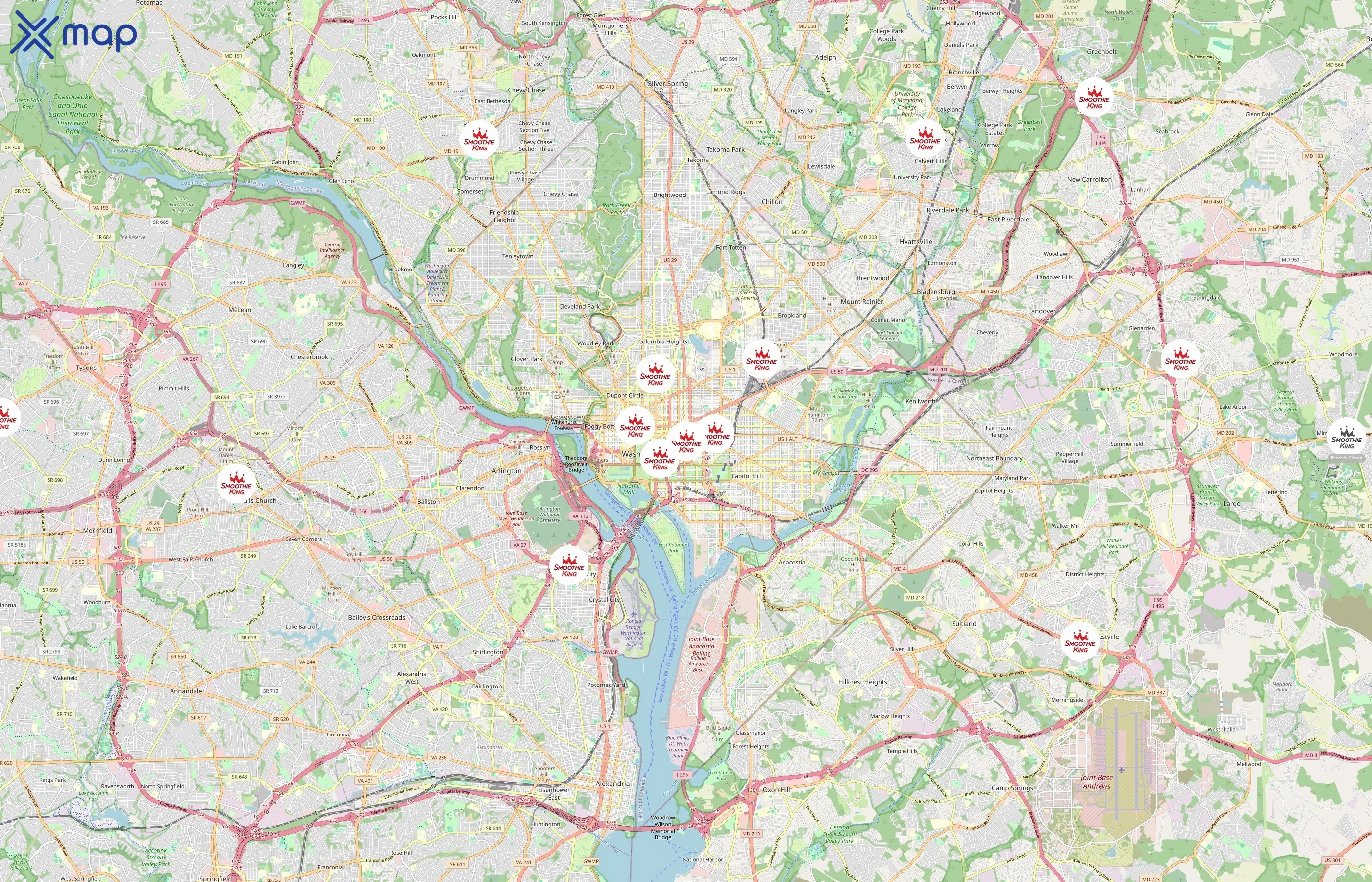
Smoothie King locations in the United States are concentrated in states with varying land areas. Texas, the largest state listed at 695,668 km², hosts 291 locations, the highest count among the states. Indiana, the smallest state by area in the table at 94,331 km², has 40 locations. Other notable states include Florida with 135 locations across 184,934 km² and Georgia with 116 locations over 153,905 km².
Business Status of Smoothie King Locations (Open vs Closed)
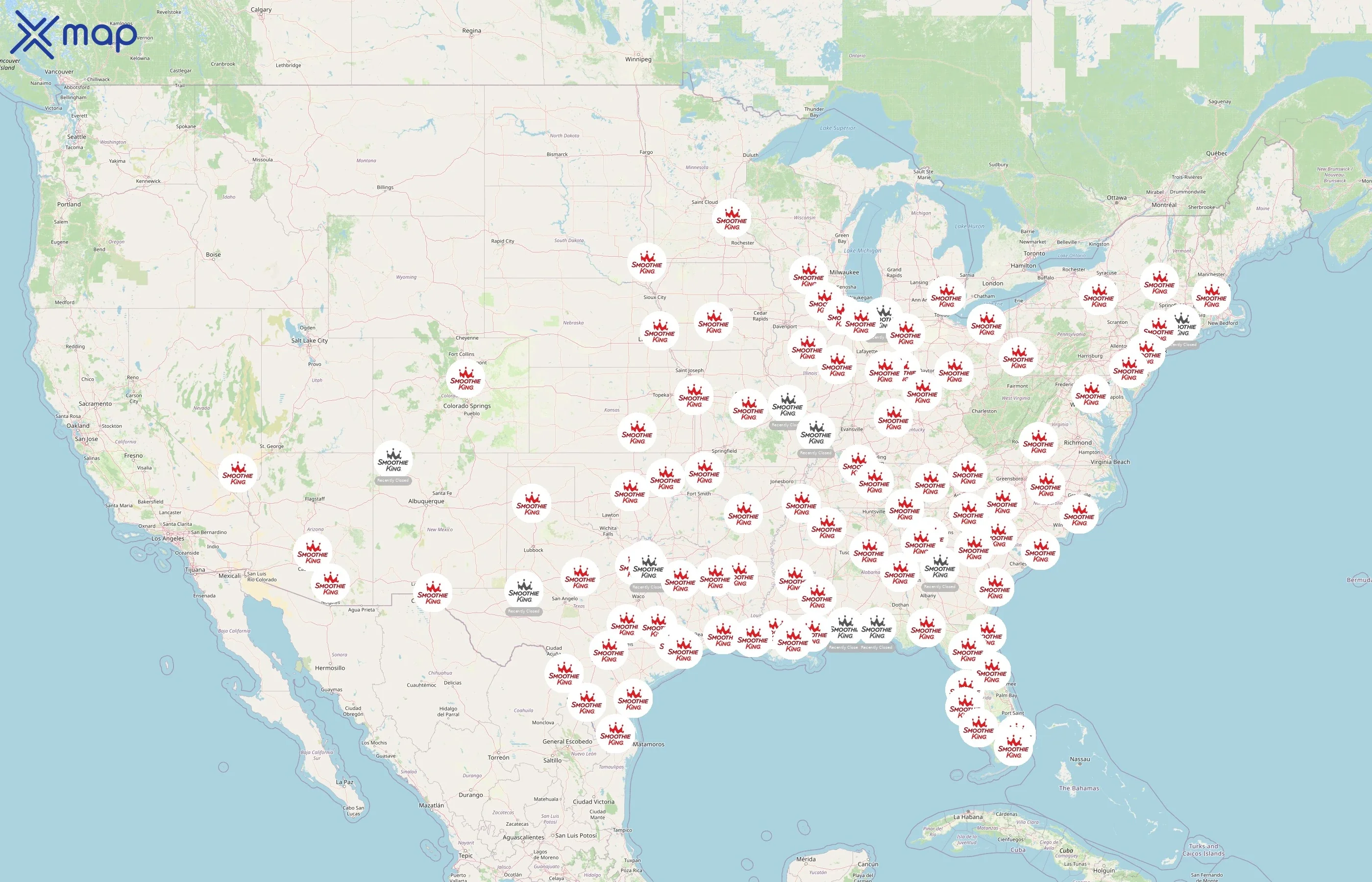
Smoothie King operates exclusively open locations across the United States, with Texas leading at 291 open stores. Florida and Georgia follow with 135 and 116 open locations respectively, all maintaining a 100% open rate. Louisiana is the only state with a slight deviation, having 104 open and 1 closed store, resulting in a 99% open rate. The remaining states each report 100% open locations, ranging from 37 to 56 stores.
Traffic Data for Smoothie King Locations (By State)
This view compares activity near Smoothie King locations across states. Using traffic scores observed around 1,246 sites, it highlights the busiest markets, states with a high share of above-average locations, and areas where activity is comparatively light. Use it to benchmark performance, prioritize field operations, and spot expansion or optimization opportunities.
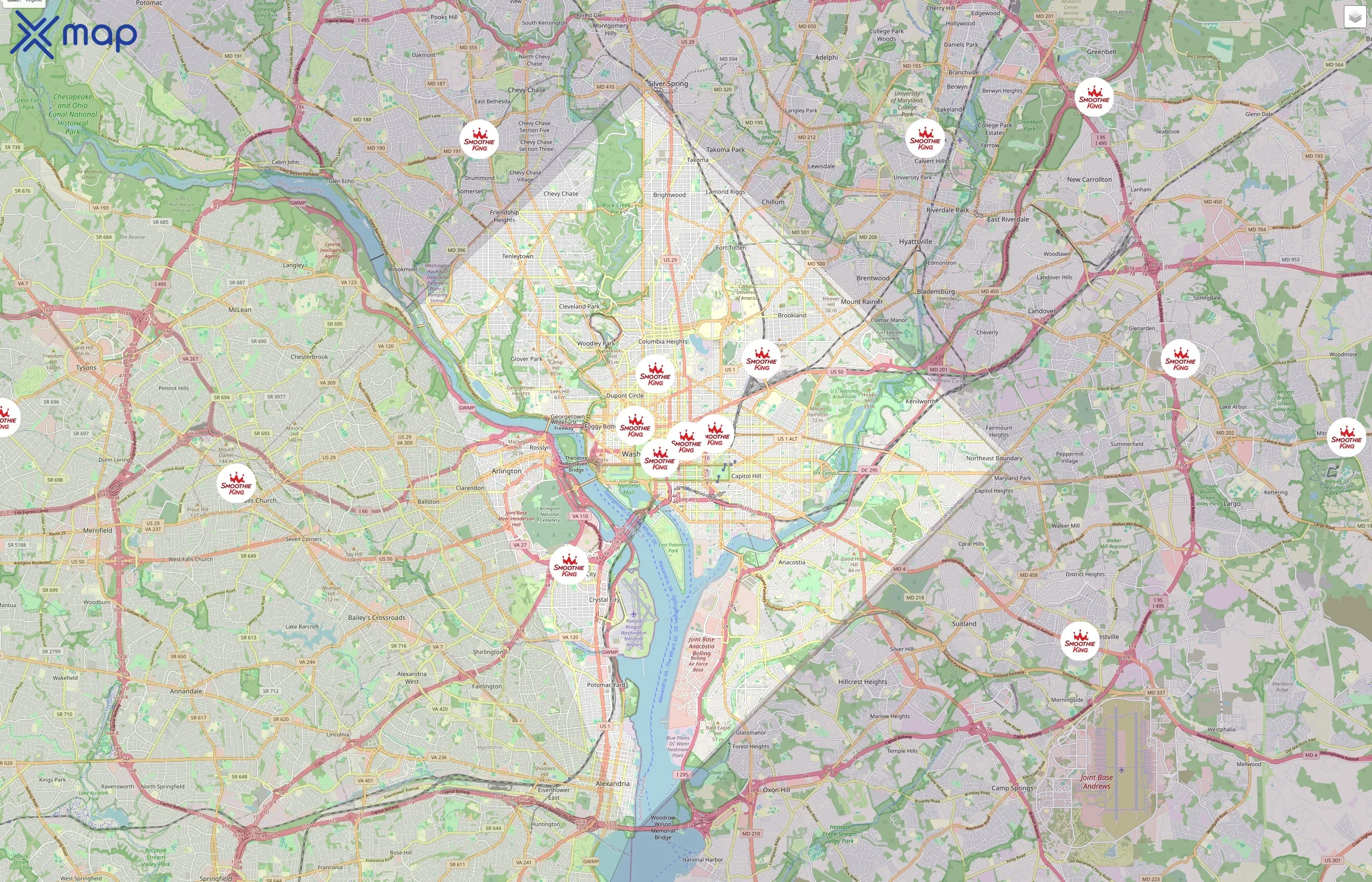
What Smoothie King locations are busy in top 10 states?
Smoothie King locations in the United States show the highest number of busy sites in Texas, with 70 out of 291 stores (24.1%). Georgia leads in the highest percentage of busy locations at 25.9%, followed closely by Missouri at 25.5% and Florida at 25.2%. States like North Carolina and Illinois report the lowest busy location percentages, at 22.9% and 23.2% respectively.
Customer Reviews and Ratings of Smoothie King Locations
This section summarizes customer sentiment toward Smoothie King. Using ratings and review totals from 1,246 locations, we highlight where scores are consistently high and where feedback volume is greatest. Average star ratings reflect perceived quality, while total reviews indicate engagement and reach across the network.

Average Ratings
Smoothie King has the highest average rating in Tennessee at 4.4, followed by Florida, Indiana, and Louisiana, each with an average rating of 4.3. Georgia also ranks high with an average rating of 4.2. Texas leads in the number of reviews with 64,615, while Georgia and Florida follow with 33,499 and 29,894 reviews respectively. Louisiana and Tennessee have 15,595 and 11,749 reviews, respectively.
Number of Reviews
Smoothie King’s highest average ratings are in Tennessee at 4.4, followed by Florida, Indiana, and Louisiana each at 4.3, and Georgia at 4.2. Texas leads in total reviews with 64,615, more than double Georgia’s 33,499 reviews. Florida, Louisiana, and Tennessee also rank in the top five for review counts, with 29,894, 15,595, and 11,749 reviews respectively.
Smoothie King Locations With Verified Contact Information

Contact Information
Smoothie King has full phone coverage in all listed states across the United States. Texas leads with 291 locations, followed by Florida with 135 and Georgia with 116, each having 100% phone availability. Other states like Louisiana, Illinois, and Tennessee also maintain complete phone coverage for all their Smoothie King locations.
Use cases for Smoothie King Points of Interests Data
Market Analysis
Smoothie King POI data enables clear measurement of footprint and demand. Analysts can rank states and cities by location count, compare coverage on a per-capita basis, and use traffic scores and review volumes to spot high-performing markets and under-served pockets. The result is an objective view of saturation, growth opportunities, and performance outliers.
Site Selection
For network planning, the data supports scoring candidate trade areas using location density, population per location, and nearby traffic intensity. Teams can evaluate cannibalization risk via nearest-store distance, surface whitespace along key corridors, and prioritize sites near retail anchors, campuses, or transit where observed activity is strongest.
Urban Planning
Planners can map clusters and service gaps to understand commercial access at the neighborhood level. Per-capita coverage highlights communities with limited access, while changes in openings or closures signal shifts in activity. These insights inform corridor revitalization, streetscape and transit planning, and data-driven zoning decisions.
How this xMap's POI data can help businesses?
- Accuracy and Precision: xMap data offers high-accuracy data, which minimizes the chances of wrong decisions based on flawed information.
- Complete Data: With xMap, businesses have access to comprehensive and complete data, effectively filling any knowledge gaps and providing a well-rounded view for decision making.
- Up-to-Date Information: xMap ensures that the data provided is regularly updated, which allows businesses to make dynamic, timely decisions in tune with current trends and situations.
- Scalability: xMap data allows businesses to scale their operations efficiently, by providing insights that cater to varying business sizes and requirements.
- Analytical Power: Utilizing xMap data's analytics can help identify patterns and trends, thus enhancing strategic planning and foresight for businesses.


